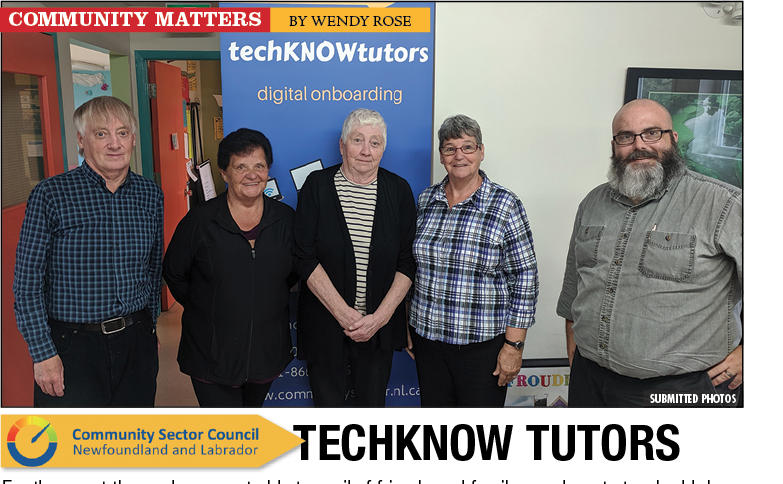For those out there who are not able to avail of friends and family members to teach old dogs new tricks, the Community Sector Council of Newfoundland and Labrador has a solution
====
A registered charity established in 1976, CSC NL has created techKNOWtutors, “a project … conceived in response to a funding proposal submitted to the Government of Canada’s Department of Innovation, Science and Economic Development Digital (ISED) Literacy Exchange Program,” Program Manager Norma Alford explained.
Natural Progression
Between 2005 and 2007, the CSC operated the Connecting for Community program, bringing IT training to five regions across the province; training 250 volunteers across 170 organizations.
CSC NL also spearheaded the VolNet initiative, supplying 500 computers for community groups. techKNOWtutors was “a natural progression for CSC NL and aligns with its central vision for a prosperous and inclusive society that supports individuals, families and communities,” Alford said.
CSC NL has a history of working with individuals who may not be fully engaged in their communities, while also aiming to attract younger volunteers.
“Many youth have tremendous knowledge about technology and the Internet so they are a natural fit for tutoring in a program … where their skills can be harnessed,” Alford added.
“techKNOWtutors also opted to focus on a daily living approach to teaching digital knowledge. The concept was to increase the local population’s Internet use for everyday activities – like banking, communicating, accessing services and employment. 
“This approach can make the Internet less intimidating and more accessible to those without experience.” In-person classes are just one aspect of the program that also offers telephone support and online training.
A ‘digital divide’
These programs were established following research in Canada that indicated a “digital divide” – “We often think of seniors as the largest population lacking these skills, however, it is also prevalent among many other population groups including persons with disabilities, newcomers to Canada, low-income individuals and Indigenous people,” Alford said.
“In Newfoundland and Labrador in particular, there is a significant gap between urban areas and rural communities in basic Internet access as well as skills. As we move toward a more digital world, individuals without knowledge and skills are unable to fully participate in society. Employment and education are increasingly digitized, along with government services, like driver’s license renewals. Even community events and social activities are being promoted through websites and social media. The need for this knowledge is paramount.”
techKNOWtutors has developed a curriculum spanning more than 15 topic-based sessions, including covering basic home computing and social networking to shopping and security.
“This list continues to expand as we receive feedback and requests from our participants,” Alford added.
“Many of our courses are stand alone, meaning participants can take them whenever and wherever it is convenient. We also heard from the community that people wanted progressive courses that moved from basic skills to more advanced levels over time. To meet that need, we’ve just launched a three-part Introduction to the Internet course which is delivered in three sessions which build on one another.
‘Drop-in’ sessions
“Along with our topic based course, we offer ‘drop-in’ sessions throughout the community during which people can come with their Internet or digital device questions and get one-on- one support. We can help people reset passwords, identify applications they like, demonstrate accessibility features and answer many other troubleshooting questions. We love offering new tips and tricks that people may not have experienced before,” she added.
“We are unique to many training programs in that we have a completely mobile lab. We have laptops, tablets, and cell phones that our participants can use during our sessions. We feel strongly about a hands-on approach and want to break down fears about technology by letting people play and learn in a supportive environment. We’re also creating a glossary of tech words and phrases to break down the jargon and make it more accessible for everyone.”
The classes are offered during daytime and in the evening, generally on weekdays in the St. John’s Metro region.
Since they started offering classes in June 2019, attendance has been steadily growing.
“Our classes average between 4-8 people which works well and allows for hands-on experience as well as one-on-one time with our instructors,” Alford shared. “We have been very fortunate that we have many repeat participants who we are able to build relationships with and we see on a regular basis,” she noted.
Feedback has been wholly positive – “One of the greatest things we hear is that people are more comfortable with technology, and they are trying things they’ve been afraid to do for so long,” Alford shared proudly.
“We incorporate suggestions for topics into our development and really enjoy hearing from participants what they are interested in. We have also identified some challenges that go beyond the scope of this project. The cost of digital hardware and Internet access, as well as the reliability and accessibility of Internet in rural areas are common things we hear. We hope techKNOWtutors, and CSC NL at large, will be able to provide this feedback to policy makers and engage in broader conversations about digital access in Newfoundland and Labrador.”
In 2020, there are plans to hire regional trainers on the Bonavista Peninsula and Bay de Verde Peninsula to offer classes in those areas, as well as expanding throughout the North East Avalon. Plans to offer programming in Labrador will coming in the upcoming years.
For more information visit: communitysector.nl.ca/techknowtutors
